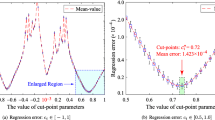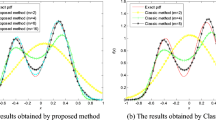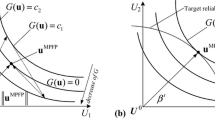Abstract
Efficiency is greatly concerned in reliability analysis community, especially for the problems with high-dimensional input random variables, because the computation cost of common reliability analysis methods may increase sharply with respect to the dimension of the problem. This paper proposes a novel meta-model based on the concepts of polynomial chaos expansion (PCE), dimension-reduction method (DRM), and information-theoretic entropy. Firstly, a PCE method based on DRM is developed to approximate the original function by a series of PCEs of univariate components. Compared with the PCE of the original function, the DRM-based PCE can reduce the computational cost. Before constructing the meta-model, a prior of the degree of the PCE is required, which determines the accuracy and efficiency of the PCE. However, the prior is usually determined by experience. According to the maximum entropy principle, this paper proposes an adaptive method for the selection of the polynomial chaos basis efficiently. With the adaptive PCE method based on DRM, a novel meta-model method is proposed, with which the reliability analysis can be achieved by Monte Carlo simulation efficiently. In order to verify the performance of the proposed method, three numerical examples and one structural dynamics engineering example are tested, with good accuracy and efficiency.























Similar content being viewed by others
References
Abraham S, Raisee M, Ghorbaniasl G, Contino F, Lacor C (2017) A robust and efficient stepwise regression method for building sparse polynomial chaos expansions. J Comput Phys 332:461–474
Acar E, Rais-Rohani M, Eamon CD (2010) Reliability estimation using univariate dimension reduction and extended generalised lambda distribution. Int J Reliab Saf 4(2–3):166–187
Berveiller M, Sudret B, Lemaire M (2006) Stochastic finite element: a non intrusive approach by regression. European Journal of Computational Mechanics/Revue Européenne de Mécanique Numérique 15(1–3):81–92
Blatman G, Sudret B (2010) Efficient computation of global sensitivity indices using sparse polynomial chaos expansions. Reliability Engineering & System Safety 95(11):1216–1229
Blatman G, Sudret B (2011) Adaptive sparse polynomial chaos expansion based on least angle regression. J Comput Phys 230(6):2345–2367
Cheng K, Lu Z (2018a) Sparse polynomial chaos expansion based on D-MORPH regression. Appl Math Comput 323:17–30
Cheng K, Lu Z (2018b) Adaptive sparse polynomial chaos expansions for global sensitivity analysis based on support vector regression. Comput Struct 194:86–96
Cheng K, Lu Z, Zhen Y (2019) Multi-level multi-fidelity sparse polynomial chaos expansion based on Gaussian process regression. Comput Methods Appl Mech Eng 349:360–377
Crestaux T, Le Maıtre O, Martinez JM (2009) Polynomial chaos expansion for sensitivity analysis. Reliability Engineering & System Safety 94(7):1161–1172
Dai H, Zhang H, Rasmussen KJ, Wang W (2015a) Wavelet density-based adaptive importance sampling method. Struct Saf 52:161–169
Dai H, Zhang H, Wang W (2015b) A multiwavelet neural network-based response surface method for structural reliability analysis. Computer-Aided Civil and Infrastructure Engineering 30(2):151–162
Du X, Chen W (2001) A most probable point-based method for efficient uncertainty analysis. J Des Manuf Autom 4(1):47–66
Du X, Chen W (2004) Sequential optimization and reliability assessment method for efficient probabilistic design. J Mech Des 126(2):225–233
Du X, Sudjianto A (2004) First order saddlepoint approximation for reliability analysis. AIAA J 42(6):1199–1207
Engelund S, Rackwitz R (1993) A benchmark study on importance sampling techniques in structural reliability. Struct Saf 12(4):255–276
Gerstner T, Griebel M (1998) Numerical integration using sparse grids. Numerical Algorithms 18(3–4):209
Ghanem R G, Spanos P D (1991) Stochastic finite element method: response statistics. In Stochastic finite elements: a spectral approach (pp. 101-119). Springer, New York, NY
Guo J, Zhao J, Zeng S (2018) Structural reliability analysis based on analytical maximum entropy method using polynomial chaos expansion. Struct Multidiscip Optim 58(3):1187–1203
Hadigol M, Doostan A (2018) Least squares polynomial chaos expansion: a review of sampling strategies. Comput Methods Appl Mech Eng 332:382–407
Hampton J, Doostan A (2015) Coherence motivated sampling and convergence analysis of least squares polynomial chaos regression. Comput Methods Appl Mech Eng 290:73–97
He W, Li G, Hao P, Zeng Y (2019a) Maximum entropy method-based reliability analysis with correlated input variables via hybrid dimension-reduction method. J Mech Des 141(10)
He W, Zeng Y, Li G (2019b) A novel structural reliability analysis method via improved maximum entropy method based on nonlinear mapping and sparse grid numerical integration. Mech Syst Signal Process 133:106247
Huang B, Du X (2006) Uncertainty analysis by dimension reduction integration and saddlepoint approximations. J Mech Des 128(1):26–33
Jaynes ET (1957) Information theory and statistical mechanics. Phys Rev 106(4):620
Karagiannis G, Lin G (2014) Selection of polynomial chaos bases via Bayesian model uncertainty methods with applications to sparse approximation of PDEs with stochastic inputs. J Comput Phys 259:114–134
Li G, He W, Zeng Y (2019) An improved maximum entropy method via fractional moments with Laplace transform for reliability analysis. Struct Multidiscip Optim 59(4):1301–1320
Liu J, Meng X, Xu C, Zhang D, Jiang C (2018) Forward and inverse structural uncertainty propagations under stochastic variables with arbitrary probability distributions. Comput Methods Appl Mech Eng 342:287–320
Lu Z, Song S, Yue Z, Wang J (2008) Reliability sensitivity method by line sampling. Struct Saf 30(6):517–532
Marelli S, Sudret B (2015) UQLab user manual–polynomial chaos expansions Chair of Risk, Safety & Uncertainty Quantification, ETH Zürich, 0.9-104 edition, 97-110
Meng Z, Keshtegar B (2019) Adaptive conjugate single-loop method for efficient reliability-based design and topology optimization. Comput Methods Appl Mech Eng 344:95–119
Meng Z, Zhou H, Hu H, Keshtegar B (2018) Enhanced sequential approximate programming using second order reliability method for accurate and efficient structural reliability-based design optimization. Appl Math Model 62:562–579
Meng Z, Zhang Z, Li G, Zhang D (2020a) An active weight learning method for efficient reliability assessment with small failure probability. Struct Multidiscip 61:1157–1170
Meng Z, Zhang Z, Zhou H (2020b) A novel experimental data-driven exponential convex model for reliability assessment with uncertain-but-bounded parameters. Appl Math Model 77:773–787
Narayan A, Jakeman J, Zhou T (2017) A Christoffel function weighted least squares algorithm for collocation approximations. Math Comput 86(306):1913–1947
Palar PS, Tsuchiya T, Parks GT (2016) Multi-fidelity non-intrusive polynomial chaos based on regression. Comput Methods Appl Mech Eng 305:579–606
Rahman S, Xu H (2004) A univariate dimension-reduction method for multi-dimensional integration in stochastic mechanics. Probabilistic Engineering Mechanics 19(4):393–408
Sadoughi MK, Li M, Hu C, MacKenzie CA, Lee S, Eshghi AT (2018) A high-dimensional reliability analysis method for simulation-based design under uncertainty. J Mech Des 140(7):071401
Saltelli A, Sobol IM (1995) About the use of rank transformation in sensitivity analysis of model output. Reliability Engineering & System Safety 50(3):225–239
Shannon CE (1948) A mathematical theory of communication. Bell system technical journal 27(3):379–423
Shao Q, Younes A, Fahs M, Mara TA (2017) Bayesian sparse polynomial chaos expansion for global sensitivity analysis. Comput Methods Appl Mech Eng 318:474–496
Shields MD, Teferra K, Hapij A, Daddazio RP (2015) Refined stratified sampling for efficient Monte Carlo based uncertainty quantification. Reliability Engineering & System Safety 142:310–325
Soize C, Ghanem R (2004) Physical systems with random uncertainties: chaos representations with arbitrary probability measure. SIAM J Sci Comput 26(2):395–410
Wan X, Karniadakis GE (2006) Multi-element generalized polynomial chaos for arbitrary probability measures. SIAM J Sci Comput 28(3):901–928
Wang Z, Chen W (2017) Confidence-based adaptive extreme response surface for time-variant reliability analysis under random excitation. Struct Saf 64:76–86
Wang H, Yan Z, Xu X, He K (2018) Evaluating influence of variable renewable energy generation on islanded microgrid power flow. IEEE Access 6:71339–71349
Wu J, Zhang D, Liu J, Han, X. (2019) A Moment Approach to Positioning Accuracy Reliability Analysis for Industrial Robots. IEEE Transactions on Reliability 99:1–1625
Wiener N (1938) The homogeneous chaos. Am J Math 60(4):897–936
Xi Z, Hu C, Youn BD (2012) A comparative study of probability estimation methods for reliability analysis. Struct Multidiscip Optim 45(1):33–52
Xi Z, Jing R, Wang P, Hu C (2014) A copula-based sampling method for data-driven prognostics. Reliability Engineering & System Safety 132:72–82
Xiong Y, Chen W, Apley D, Ding X (2007) A non-stationary covariance-based Kriging method for metamodelling in engineering design. Int J Numer Methods Eng 71(6):733–756
Xiu D, Karniadakis GE (2002a) Modeling uncertainty in steady state diffusion problems via generalized polynomial chaos. Comput Methods Appl Mech Eng 191(43):4927–4948
Xiu D, Karniadakis GE (2002b) The Wiener--Askey polynomial chaos for stochastic differential equations. SIAM J Sci Comput 24(2):619–644
Xiu D, Karniadakis GE (2003) Modeling uncertainty in flow simulations via generalized polynomial chaos. J Comput Phys 187(1):137–167
Xu J, Kong F (2018a) A new unequal-weighted sampling method for efficient reliability analysis. Reliability Engineering & System Safety 172:94–102
Xu J, Kong F (2018b) A cubature collocation based sparse polynomial chaos expansion for efficient structural reliability analysis. Struct Saf 74:24–31
Xu J, Wang D (2019) Structural reliability analysis based on polynomial chaos, Voronoi cells and dimension reduction technique. Reliability Engineering & System Safety 185:329–340
Xu J, Dang C, Kong F (2017) Efficient reliability analysis of structures with the rotational quasi-symmetric point-and the maximum entropy methods. Mech Syst Signal Process 95:58–76
Youn BD, Xi Z (2009) Reliability-based robust design optimization using the eigenvector dimension reduction (EDR) method. Struct Multidiscip Optim 37(5):475–492
Youn BD, Choi KK, Yi K (2005) Performance moment integration (PMI) method for quality assessment in reliability-based robust design optimization. Mechanics Based Design of Structures and Machines 33(2):185–213
Youn BD, Xi Z, Wang P (2008) Eigenvector dimension reduction (EDR) method for sensitivity-free probability analysis. Struct Multidiscip Optim 37(1):13–28
Zhang X (2013) Efficient computational methods for structural reliability and global sensitivity analyses
Zhang D, Han X (2020) Kinematic reliability analysis of robotic manipulator. J Mech Des 142(4):044502
Zhang X, Pandey MD (2013) Structural reliability analysis based on the concepts of entropy, fractional moment and dimensional reduction method. Struct Saf 43:28–40
Zhang L, Lu Z, Wang P (2015) Efficient structural reliability analysis method based on advanced Kriging model. Appl Math Model 39(2):781–793
Zhang D, Han X, Jiang C, Liu J, Li Q (2017) Time-dependent reliability analysis through response surface method. J Mech Des 139(4):041404
Zhang X, Wang L, Sørensen JD (2019) REIF: a novel active-learning function toward adaptive Kriging surrogate models for structural reliability analysis. Reliability Engineering & System Safety 185:440–454
Zhang X, Wang L, Sørensen JD (2020) AKOIS: an adaptive Kriging oriented importance sampling method for structural system reliability analysis. Struct Saf 82:101876
Zhou Y, Lu Z, Cheng K (2019) Sparse polynomial chaos expansions for global sensitivity analysis with partial least squares and distance correlation. Struct Multidiscip Optim 59(1):229–247
Zhu Z, Du X (2016) Reliability analysis with Monte Carlo simulation and dependent Kriging predictions. J Mech Des 138(12):121403
Replication of results
As comprehensive implementation details are provided, we are confident that the methodology in this paper is reproducible. Therefore, no additional data and code is appended. If one is interested in the methodology and needs more help for the reproduction, please feel free to contact the corresponding author by email.
Funding
The supports were received from the National Key Research and Development Program (Grant No.: 2019YFA0706803) and the National Natural Science Foundation of China (Grant No.: 11872142) are greatly appreciated. The lead author received financial support from China Scholarship Council for his visit at University of Waterloo.
Author information
Authors and Affiliations
Corresponding author
Ethics declarations
Conflict of interest
The authors declare that they have no conflict of interest.
Additional information
Responsible Editor: Pingfeng Wang
Publisher’s note
Springer Nature remains neutral with regard to jurisdictional claims in published maps and institutional affiliations.
Rights and permissions
About this article
Cite this article
He, W., Zeng, Y. & Li, G. An adaptive polynomial chaos expansion for high-dimensional reliability analysis. Struct Multidisc Optim 62, 2051–2067 (2020). https://doi.org/10.1007/s00158-020-02594-4
Received:
Revised:
Accepted:
Published:
Issue Date:
DOI: https://doi.org/10.1007/s00158-020-02594-4




